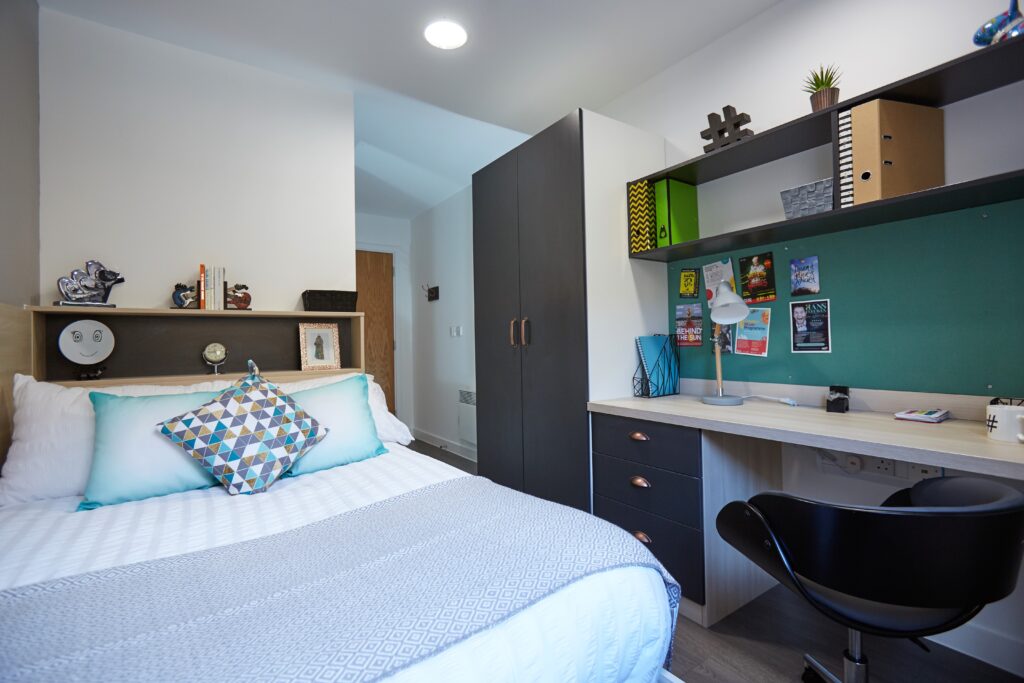Birmingham Accommodation Guide
We recognise the importance of students being able to find suitable accommodation whilst studying at BIMM Music Institute. It’s a big part of your student experience, and our accommodation guide below is here to answer all of your questions. BIMM Music Institute doesn’t have student halls, but this won’t get in your way as there are plenty of private halls and private letting opportunities around the city.
We’ll give you the inside track on dealing with estate agents, what to look for when house viewing and where the best places are to live in the city. We’ll also further discuss your different accommodation options, such as private student accommodation or house shares.
Our friendly Student Support Team are here should you need further accommodation advice, so don’t hesitate to get in touch.

Book your 2025/26 student accommodation – Exclusive to BIMM Students!
BIMM Music Institute has partnered with top student accommodation provider, Amber, to service all our campus locations, ensuring you have exclusive access to the best living spaces in the city. Say goodbye to the hassle of searching for the ideal place to live and hello to a worry-free academic year.
What can you expect?
- Prime Locations: Our accommodations are conveniently located near campus and local amenities.
- Comfortable Living: Enjoy well-furnished and fully equipped spaces designed with students in mind.
- Affordable Options: We offer a range of budget-friendly choices to suit your financial needs.
- Safety First: Your security is our priority; our accommodations are equipped with modern safety features.
- Peace of Mind: Our exclusive properties are verified, and price match guaranteed.
- Early Bird Offers: Take advantage of rent reductions by booking early and unlock savings on moving and lifestyle expenses like restaurant charges, luggage fees, gym memberships, and so much more!
This exclusive opportunity is only available via the BIMM University Accommodation Portal. You won’t find these offers or accommodations on Amber’s public listings—don’t miss out!


City Centre
A range of different private halls and private rented flats are available to choose from in the city centre. Choosing to live in the city centre means you have the option to walk to university. It also means you are close to the city centre and all the exciting things happening there.
Selly Oak
Selly Oaks is popular with students looking to live in student houses rather than flats or halls. It is referred to locally as ‘student city’ with many options for house shares of all different sizes and prices. Being a short train or bus ride out of the city means there are loads of green spaces close by, including the beautiful Cannon Hill Park.

Alternatively, there are many letting agencies and private landlords based in Birmingham. If you are going through a lettings agent, you will be expected to pay a holding fee, agency fees, a deposit and sometimes one month’s rent upfront and provide a guarantor. If you are using a private lettings agent, make sure they follow the code of practice of the National Association of Estate Agents.
Local accommodation can be found here:
If you are worried about student accommodation, our team are on hand to help you and answer any questions you may have.
Bristol Street Student Accommodation
- Distance to campus: 20 min walk
- Includes bills, outdoor space, 24-hour security, and onsite laundry
The Old Fire Station
- Distance to campus: 25 min walk
- Includes bills, gym, free Wi-Fi, social and workspaces, and onsite laundry
The Heights
- Distance to campus: 25 min walk
- Includes bills, gym, free Wi-Fi, social and workspaces, and onsite laundry and a courtyard
Belgrave View
- Distance to campus: 25 min walk
- Includes bills, gym, music rehearsal space, free events and free contents insurance
Jennens Court
- Distance to campus: 15 min walk
- Includes bills, dedicated study space, cinema room, courtyard, and laundry room
- We recommend viewing a property at least twice. You’ll be more likely to notice problems the second time around
- Take someone with you or let someone else know exactly where you are when you visit a property, just to err on the side of caution
- It’s also a good idea to visit the area at night. If you do this, please ensure you stick to the point above and take someone with you
- Make sure you and all your other housemates view the property. Don’t take someone else’s word that the property is right for you
- Compare a range of different landlords and properties
- Take your time and don’t let landlords pressure you – there is a surplus of good properties in the area and you will find somewhere you like
- When you go to view, take notes and photos and use our checklist to make sure you don’t miss anything.
- Get informed – knowing your rights will help you view properties more critically and put you in a stronger negotiating position

Any Questions?
For any questions regarding student accommodation or if you’d like more information on how to apply to BIMM Music Institute Birmingham, please contact our Enquiries Team on 01273 840 346 or email [email protected].

